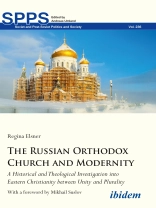The Russian Orthodox Church (ROC) faced various iterations of modernization throughout its history. This conflicted encounter continues in the ROC’s current resistance against—what it perceives as—Western modernity including liberal and secular values. This study examines the historical development of the ROC’s arguments against—and sometimes preferences for—modernization and analyzes which positions ended up influencing the official doctrine. The book’s systematic analysis of dogmatic treatises shows the ROC’s considerable ability of constructive engagement with various aspects of the modern world. Balancing between theological traditions of unity and plurality, the ROC’s today context of operating within an authoritarian state appears to tip the scale in favor of unity.
Об авторе
Dr. Regina Elsner studied Catholic Theology in Berlin and Münster. Since 2017, she has been a Research Fellow in the Social Ethics of Orthodox Christianity at the Center for East European and International Studies (ZOi S) in Berlin. Previously, Elsner worked as Research Associate at the Ecumenical Institute of Münster (2010–2014) and Project Coordinator for Caritas Russia (2005–2010). Elsner co-heads the German Association for East European Studies’ Religion Section and is a member of the PRO ORIENTE Steering Committee for Orthodox-Catholic Dialogue. Her papers have been published by, among other outlets, the Jahrbuch für Christliche Sozialwissenschaften, Public Orthodoxy, Berkley Forum, Russland-Analysen, and Ukraine-Analysen.







![Обложка Brian Schrag & Julisa Rowe: Community Arts for God's Purposes [Chinese] 貼近神心意的社群藝術 Обложка Brian Schrag & Julisa Rowe: Community Arts for God's Purposes [Chinese] 貼近神心意的社群藝術](https://static.worldofdigitals.com/thumb_webp/740/9781645083740.webp)




